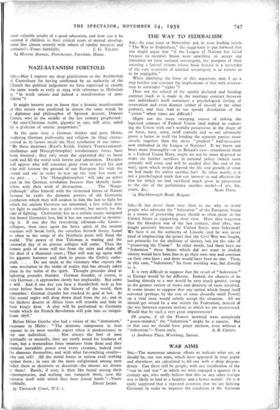WAR AIMS SIR,—The numerous amateur efforts to indicate what are,
or should be, our war aims, which have appeared in your paper and elsewhere, are calculated to fill one with a deep despon- dency. Can there still be people, with any recollection of the "war to end war" in which we were engaged a quarter of a century ago, who really believe that this or any other foreign war is likely to lead to a brighter and a better world? Or is it really supposed that a repeated assertion that we are fighting Germany in order to improve the condition of the German
people is likely to carry much conviction? We were all familiar in our childhood with the statement that we were being beaten for our good, but this was hardly a belief in which at the time we were able to share.
Then there is the statement that we shall only conclude peace when there is a Germany we can trust. Has Germany within the memory of man possessed such a Government, and does not this statement foreshadow a war destined to last not for three years, but for thirty years at least?
It was a relief to find Mr. Harold Nicblson in your November toth issue, speaking of the barbarians from the East. Surely all that we need think about at the moment is that we have to defeat these barbarians so completely as to render them innocuous for as long a time as may be.
The Treaty of Versailles, which all now seem united to condemn—often with little knowledge of its voluminous con- tents—may have contained, and, indeed, undoubtedly did contain, some provisions such as those in the Reparations Chapter, which were unwise ; and some, such as the proposal to put the Kaiser on trial, which were simply silly ; but it at least was founded on two sound propositions. These were that a Germany rich and strong is inevitably aggressive, and that without adequate guarantees it is impossible to trust the word of any German Government. I venture to think these two propositions, held firmly at the time by the French—who certainly had reason better than any other people to know the Germans—are as true now as they were then.
I end as I began. It is only too probable that the world after the war will be a much less pleasant place to live in than the world of our childhood, but it is at least to be hoped that we shall take adequate precautions to make it a safer world than that in which we have lived in recent years.—I am, Sir,
&c., H. FOUNTAIN. Little Mote, Eynsford, Kent.





































 Previous page
Previous page